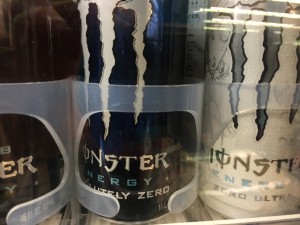Caffeine: How Much is Too Much?

You may not have heard, but as they do every five years, the U.S. has recently released the 2015-2020 Dietary Guidelines for Americans. This year they added something new – the consumption of caffeine in the diet. The statements in the guidelines specifically focus on caffeine in coffee, as that is where most of the research is focused. The guidelines say that moderate coffee consumption, which they describe as 3-5 eight ounce cups of coffee per day, can be incorporated in a healthy diet. They recommend a maximum amount of caffeine of 400mg per day. You can read more about it here: 2015-2020 Dietary Guidelines
The guidelines add that if you aren’t already consuming these beverages, it is not wise to start. They also caution that some of these beverages have lots of added sugar and fat which should be limited in the diet. Pretty standard stuff, if you ask me.
What strikes me as interesting, however, is what they leave out of these guidelines – energy drinks and other caffeinated products. The availability of heavily caffeinated beverages and other foods has greatly increased in recent years. I recently was in the checkout line in the grocery store and noticed a chocolate bar labeled “Awake” that made all sorts of clever claims about what it’s caffeine could do for you. They make excess caffeine sound like an exciting addition to your life. 
The problem at this point is that we increasingly have anecdotal evidence that there could be dangers from consuming high amounts of caffeine. Yes, I know that the experiences of a few people do not provide a scientific basis for making a recommendation against these products. But nearly every day on Facebook, I look at photos of the children of one of my former students, children who are growing up without their mom. She didn’t think energy drinks would cause her any health problems, but they did. Why would she? Certainly not from reading the labels of these products.
I realize that Dietary Guidelines need to be based on sound research. That’s as it should be. But let’s get that research done. In the meantime, I have been collecting articles and web links about the effects of caffeine, both good and bad. Please take a look at the information in my Flipboard Magazine on these products and think twice before consuming them.
View my Flipboard Magazine.
Leave a Reply